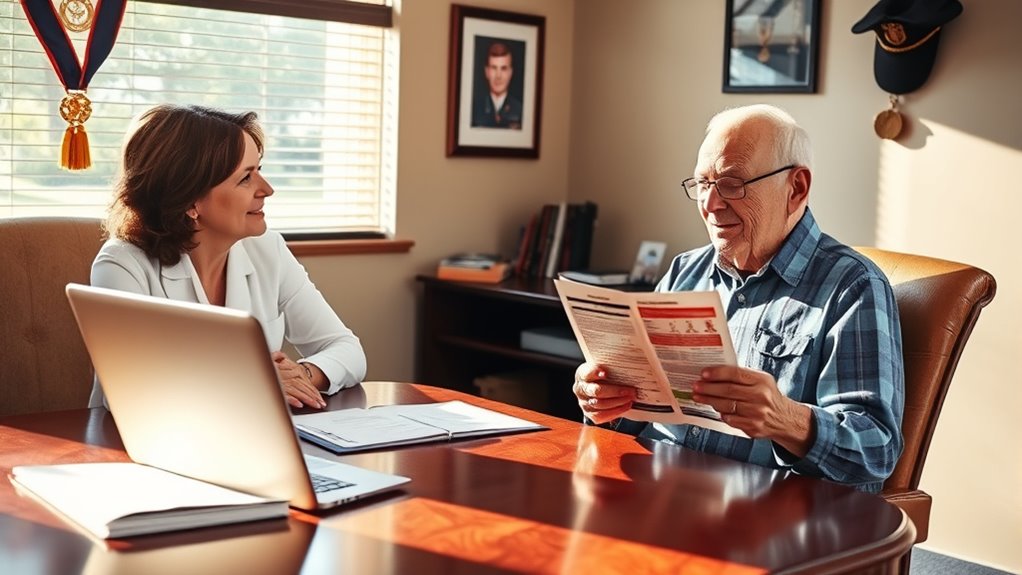Understanding veterans’ benefits for elder care helps you access vital financial support and services as you age. You may qualify for military pensions, which provide steady income after years of service, or disability compensation for health issues related to service. Additional benefits like aid and attendance can cover care costs or home modifications. Knowing how these benefits interact with other programs ensures you get the maximum support. Keep exploring to learn how to navigate and optimize your benefits.
Key Takeaways
- Military pensions provide a steady, often tax-exempt income stream for aging veterans after long service.
- Disability compensation offers monthly payments based on service-related disabilities, supporting elder care needs.
- Additional benefits like aid and attendance can help cover personal care and home modifications for disabled veterans.
- Benefits may interact with other elder programs, so understanding eligibility and coordination is essential.
- Contact VA or benefits counselors to navigate application processes and maximize available veteran support.

If you’re a veteran seeking elder care options, understanding your benefits can make a meaningful difference. Knowing what programs and financial supports are available helps you plan for your future and guarantees you receive the care you deserve. Two key benefits to be aware of are military pensions and disability compensation. Military pensions are retirement benefits earned after completing qualifying active service, typically providing a steady income stream. These pensions are often tax-exempt and can help cover daily living expenses as you age. If you served for a specified period, usually 20 years or more, you might be eligible for this benefit, which is designed to reward your dedication and service.
Disability compensation is another essential benefit that many veterans qualify for, especially if service-related health issues continue into old age. This benefit provides monthly payments to veterans who have disabilities caused or worsened by their military service. The amount varies depending on the severity of the disability, and it can considerably supplement your income, making it easier to afford elder care services. If you have a disability rating of 30% or higher, you could also qualify for additional benefits such as aid and attendance allowances, which help cover the costs of personal care, home modifications, or nursing home expenses.
Understanding how these benefits interact with other elder care programs is important. For instance, your military pension might affect your eligibility for certain state or federal assistance programs but usually doesn’t impact your disability compensation, which is generally protected from garnishment. It’s also important to recognize that disability compensation isn’t solely for physical disabilities; mental health conditions related to service, such as PTSD, can also qualify you for this benefit.
Understanding how military pensions and disability compensation interact with other elder care programs is crucial for veterans.
Getting accurate information about your benefits starts with contacting the VA or visiting their website. You should review your service records to confirm your eligibility and consider consulting a VA representative or a veterans’ benefits counselor who can help you navigate the application process. They can assist in determining what specific benefits you qualify for and how to maximize your entitlements. Remember, benefits like military pensions and disability compensation are designed to support you as you age, guaranteeing you have financial stability and access to necessary care.
Frequently Asked Questions
Are Veterans’ Benefits Available for Non-Service-Related Health Issues?
You might wonder if veterans’ benefits cover non-service-related health issues. Generally, benefit eligibility for non-service health concerns is limited unless you qualify for specific programs like VA health insurance, which prioritizes service-connected conditions. To access these benefits, you’ll need to meet certain criteria, and your health issue’s connection to your service impacts your eligibility. It’s best to check with the VA to understand your options for non-service health concerns.
How Do I Apply for Veteran Elder Care Benefits Online?
To apply for veteran elder care benefits online, start by visiting the official VA website. Follow their step-by-step guide to create an account or log in. Complete the online application form, providing necessary personal and service information. Upload any required documents, then submit your application. Make sure to review all details carefully before submission. You’ll receive confirmation and updates via email, helping you track your application’s progress easily.
Can Family Members Access Veteran Benefits on Behalf of Elders?
Yes, family members can access veteran benefits for elders if they have a valid power of attorney. This legal document grants you the authority to manage benefit eligibility and handle claims on behalf of the veteran. Make sure the power of attorney is current and properly filed. With it, you can contact the VA, apply for benefits, and ensure the elder receives the care they deserve efficiently.
What Is the Income Limit to Qualify for Veteran Elder Care Benefits?
You want to know the income threshold for veteran elder care benefits. The benefit eligibility often depends on your income, with many programs setting a limit around $2,000 to $3,000 per month for a single veteran. This threshold can vary based on the specific benefit and state. To verify you qualify, check the latest guidelines or speak directly with a VA representative, as income limits may change.
Are Veterans’ Benefits Transferable to Surviving Family Members?
You might wonder if veterans’ benefits are transferable to surviving family members. It turns out, benefits transferability varies; some survivor benefits, like Dependency and Indemnity Compensation (DIC), do pass to eligible family members. However, not all benefits transfer automatically. To maximize survivor benefits, you should explore specific programs and eligibility criteria, ensuring your loved ones receive the support they deserve after your service.
Conclusion
By understanding veterans’ benefits, you hold a key to open the fortress of elder care support. Think of these benefits as a sturdy bridge, guiding you safely across the turbulent waters of aging. With this knowledge, you can navigate the complex landscape confidently, ensuring your loved ones are surrounded by the care they deserve. Remember, your awareness is the lantern that lights the path through the shadows of uncertainty, leading to a brighter, more secure future.









